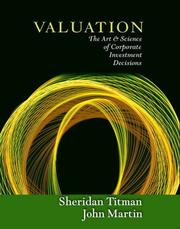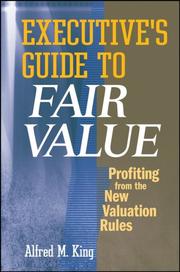| Listing 1 - 10 of 56 | << page >> |
Sort by
|
Book
ISBN: 9780521519076 0521519071 9780521737319 0521737311 9780511626739 1107191890 9786612390913 0511646496 1282390910 0511650574 0511538960 0511538138 0511539800 9780511650574 9780511538964 0511626738 9780511538964 Year: 2009 Publisher: Cambridge, U.K. New York Cambridge University Press
Abstract | Keywords | Export | Availability | Bookmark
 Loading...
Loading...Choose an application
- Reference Manager
- EndNote
- RefWorks (Direct export to RefWorks)
Sources of Value is a comprehensive guide to financial decision making suitable for beginners as well as experienced practitioners. It treats financial decision making as both an art and a science and proposes a comprehensive approach through which companies can maximise their value. Beginners will benefit from its initial financial foundation section which builds strong basic skills. Practitioners will enjoy the new insights which the eponymous Sources of Value technique offers - where values come from and why some companies can expect to create it while others cannot. The book also introduces several other techniques which, together, spell out how to combine strategy with valuation and an understanding of accounts to make a fundamental improvement in the quality of corporate financial decision taking. Sources of Value is written in a readable conversational style and will appeal to those already working in companies as well as those studying on a business course.
Valuation. --- Appraisal --- Capitalization (Finance) --- Economic valuation --- Property --- Accounting --- Valuation --- Business, Economy and Management --- Economics
Book
ISSN: 17933641 ISBN: 1281911585 9786611911584 9812770747 9789812770745 9812770739 9789812770738 Year: 2008 Volume: 3 Publisher: Singapore Hackensack, NJ World Scientific
Abstract | Keywords | Export | Availability | Bookmark
 Loading...
Loading...Choose an application
- Reference Manager
- EndNote
- RefWorks (Direct export to RefWorks)
This book provides a comprehensive discussion of the issues related to risk, volatility, value and risk management. It includes a selection of the best papers presented at the Fourth International Finance Conference 2007, qualified by Professor James Heckman, the 2000 Nobel Prize Laureate in Economics, as a ""high level"" one. The first half of the book examines ways to manage risk and compute value-at-risk for exchange risk associated to debt portfolios and portfolios of equity. It also covers the Basel II framework implementation and securitisation. The effects of volatility and risk on the
Risk management --- Valuation --- Appraisal --- Capitalization (Finance) --- Economic valuation --- Property --- Accounting --- Management --- Finance --- IFC --- Asset pricing --- Value
Book
Year: 2016 Publisher: Frontiers Media SA
Abstract | Keywords | Export | Availability | Bookmark
 Loading...
Loading...Choose an application
- Reference Manager
- EndNote
- RefWorks (Direct export to RefWorks)
Protected marine species have populations that are depleted, decreasing, or are at-risk of extinction or local extirpation. As of 2015 The International Union for the Conservation of Nature, a global environmental organization, lists approximately 737 marine species worldwide that are considered at risk of extinction. Many are provided legal protection through national laws requiring research and management measures aimed at recovering and maintaining the species at a sustainable population level. Integral to the policy decision process involving the management and recovery of marine species is the consideration of trade-offs between the economic and ecological costs and benefits of protection. This suggests that economics, at its core the study of trade-offs, has a significant role.
Non-compliance --- Habitat restoration --- marine management --- Benefit transfer --- Incentive instruments --- bycatch --- protected species --- economic valuation --- ecosystem services --- Non-compliance --- Habitat restoration --- marine management --- Benefit transfer --- Incentive instruments --- bycatch --- protected species --- economic valuation --- ecosystem services
Book
Year: 2016 Publisher: Frontiers Media SA
Abstract | Keywords | Export | Availability | Bookmark
 Loading...
Loading...Choose an application
- Reference Manager
- EndNote
- RefWorks (Direct export to RefWorks)
Protected marine species have populations that are depleted, decreasing, or are at-risk of extinction or local extirpation. As of 2015 The International Union for the Conservation of Nature, a global environmental organization, lists approximately 737 marine species worldwide that are considered at risk of extinction. Many are provided legal protection through national laws requiring research and management measures aimed at recovering and maintaining the species at a sustainable population level. Integral to the policy decision process involving the management and recovery of marine species is the consideration of trade-offs between the economic and ecological costs and benefits of protection. This suggests that economics, at its core the study of trade-offs, has a significant role.
Non-compliance --- Habitat restoration --- marine management --- Benefit transfer --- Incentive instruments --- bycatch --- protected species --- economic valuation --- ecosystem services
Book
Year: 2016 Publisher: Frontiers Media SA
Abstract | Keywords | Export | Availability | Bookmark
 Loading...
Loading...Choose an application
- Reference Manager
- EndNote
- RefWorks (Direct export to RefWorks)
Protected marine species have populations that are depleted, decreasing, or are at-risk of extinction or local extirpation. As of 2015 The International Union for the Conservation of Nature, a global environmental organization, lists approximately 737 marine species worldwide that are considered at risk of extinction. Many are provided legal protection through national laws requiring research and management measures aimed at recovering and maintaining the species at a sustainable population level. Integral to the policy decision process involving the management and recovery of marine species is the consideration of trade-offs between the economic and ecological costs and benefits of protection. This suggests that economics, at its core the study of trade-offs, has a significant role.
Non-compliance --- Habitat restoration --- marine management --- Benefit transfer --- Incentive instruments --- bycatch --- protected species --- economic valuation --- ecosystem services
Book
ISBN: 303135057X 3031350561 Year: 2023 Publisher: Cham : Springer Nature Switzerland : Imprint: Palgrave Macmillan,
Abstract | Keywords | Export | Availability | Bookmark
 Loading...
Loading...Choose an application
- Reference Manager
- EndNote
- RefWorks (Direct export to RefWorks)
This Pivot book focuses on both the essentials of asset management and current industry trends, specifically the development from an active management approach to a focus on ESG investments. The first part of the book outlines the dynamics that have traditionally characterised the asset management industry, including the distinction between active and passive portfolio management, the emergence of Exchange Traded Funds (EFTs) which have dominated portfolio allocation over the last 25 years, and the growth of the factor investing approach. It then explores how ESG principles have evolved into a primary focus for investors over the last few years, and how the growing importance placed on the establishment of homogeneous ESG criteria across companies now involves investors and asset managers as well as regulators. The final section of the book considers climate finance as a new challenge for asset management, which insists on portfolio choices that aim to mitigate the effects of climate change. This book offers new perspectives on the academic debate around differing investment philosophies as well as offering an empirical analysis of ESG benchmarks used across the industry. It will be of interest to academics and practitioners in finance and banking broadly, including those working in climate finance, investment behaviour, and corporate governance. Enrica Bolognesi is an Associate Professor of Financial Markets and Intermediaries in the Department of Economics and Statistics of the University of Udine. She is the Director of the Bachelor’s and Master’s Degrees in Banking and Finance. Previously, she worked in the asset management industry as equity portfolio manager.
Financial services industry. --- Valuation. --- Financial risk management. --- Financial Services. --- Investment Appraisal. --- Risk Management. --- Risk management --- Appraisal --- Capitalization (Finance) --- Economic valuation --- Property --- Accounting --- Services, Financial --- Service industries --- Valuation
Book
ISBN: 3031321839 3031321820 Year: 2023 Publisher: Cham : Springer International Publishing : Imprint: Palgrave Macmillan,
Abstract | Keywords | Export | Availability | Bookmark
 Loading...
Loading...Choose an application
- Reference Manager
- EndNote
- RefWorks (Direct export to RefWorks)
Impact investing is a dynamic field that has been recently been discussed as a supplemental funding source for addressing societal problems. The topic has generated significant interest and is presumed to achieve significant growth rates for the coming years. This book provides a refreshed yet comprehensive overview about the market, financial instruments and the associated impact assessment. Specifically, it covers the concept of impact investing within the broader field of social finance as well as the relevant (and new) actors, presents current financing instruments and the various tools to assess the impact of the investing strategy, and introduces valuation and fund modelling techniques which impact the investment decision of fund managers. This useful reference tool will be of interest to academics and researchers in the field of impact investing alongside students and practitioners in the space. Wolfgang Spiess-Knafl is Co-Director of the European Center for Social Finance and Managing Director of Next Generation Impact in Vienna. He has worked on the development of the social finance market for the European Commission and written studies on social finance for the European Parliament or the European Liberal Forum, among others. Recently, he has written a book on “Artificial Intelligence and Blockchain for Social Impact”. Barbara Scheck is the Professor for Entrepreneurship at Munich Business School and Co-Director of the European Center for Social Finance. Her research focuses on the financing of social enterprises, impact and mission-related investing and impact assessment. Prior to joining MBS, Barbara was assistant professor for social investment at Hamburg University.
Development economics. --- Financial services industry. --- Valuation. --- Development Economics. --- Financial Services. --- Investment Appraisal. --- Appraisal --- Capitalization (Finance) --- Economic valuation --- Property --- Accounting --- Services, Financial --- Service industries --- Economics --- Economic development --- Valuation

ISBN: 9780321336101 0321336100 Year: 2008 Publisher: Boston Pearson Addison Wesley
Abstract | Keywords | Export | Availability | Bookmark
 Loading...
Loading...Choose an application
- Reference Manager
- EndNote
- RefWorks (Direct export to RefWorks)
Valuation --- Capital investments --- waardebepaling ondernemingen --- financieel management --- bedrijfsstrategie --- Appraisal --- Capitalization (Finance) --- Economic valuation --- Property --- Accounting --- Capital expenditures --- Capital improvements --- Capital spending --- Fixed asset expenditures --- Plant and equipment investments --- Plant investments --- Investments --- Investment management

ISBN: 0470173297 1119197856 9786611222048 1281222046 0470245530 9780470245538 9781119197850 9780470173299 Year: 2008 Publisher: Hoboken, N.J. : J. Wiley & Sons,
Abstract | Keywords | Export | Availability | Bookmark
 Loading...
Loading...Choose an application
- Reference Manager
- EndNote
- RefWorks (Direct export to RefWorks)
Praise for Executive's Guide to Fair Value: Profiting from the New Valuation Rules""The advent of fair value reporting is not your Momma's (or your Papa's) kind of accounting. If you're a financial professional above the age of twenty-five who is working in industry, read this book. From choosing a fair value specialist to the perils of 'made as instructed' valuations to purchase price allocations to impairment testing to that SEC tripwire, customer relationships, fair value expert Al King gets it right. And he does so with neither jargon nor literary anesthesia. As a former CFO myself
Fair value - United States. --- Fair value. --- Valuation - United States. --- Fair value --- Valuation --- Accounting --- Commerce --- Business & Economics --- Appraisal --- Capitalization (Finance) --- Economic valuation --- Property --- Fair market value --- Value --- Public utilities --- Rates --- E-books
Book
ISBN: 0566001926 9780566001925 Year: 1979 Publisher: Westmead
Abstract | Keywords | Export | Availability | Bookmark
 Loading...
Loading...Choose an application
- Reference Manager
- EndNote
- RefWorks (Direct export to RefWorks)
Valuation. --- Managerial economics. --- -Managerial economics --- Economic valuation --- Capital expenditures --- Capital improvements --- Capital spending --- Fixed asset expenditures --- Plant and equipment investments --- Plant investments --- Investment management --- Capital investments --- Valuation --- Managerial economics --- Decision making --- Decision making. --- Capital investments - Decision making
| Listing 1 - 10 of 56 | << page >> |
Sort by
|

 Search
Search Feedback
Feedback About UniCat
About UniCat  Help
Help News
News